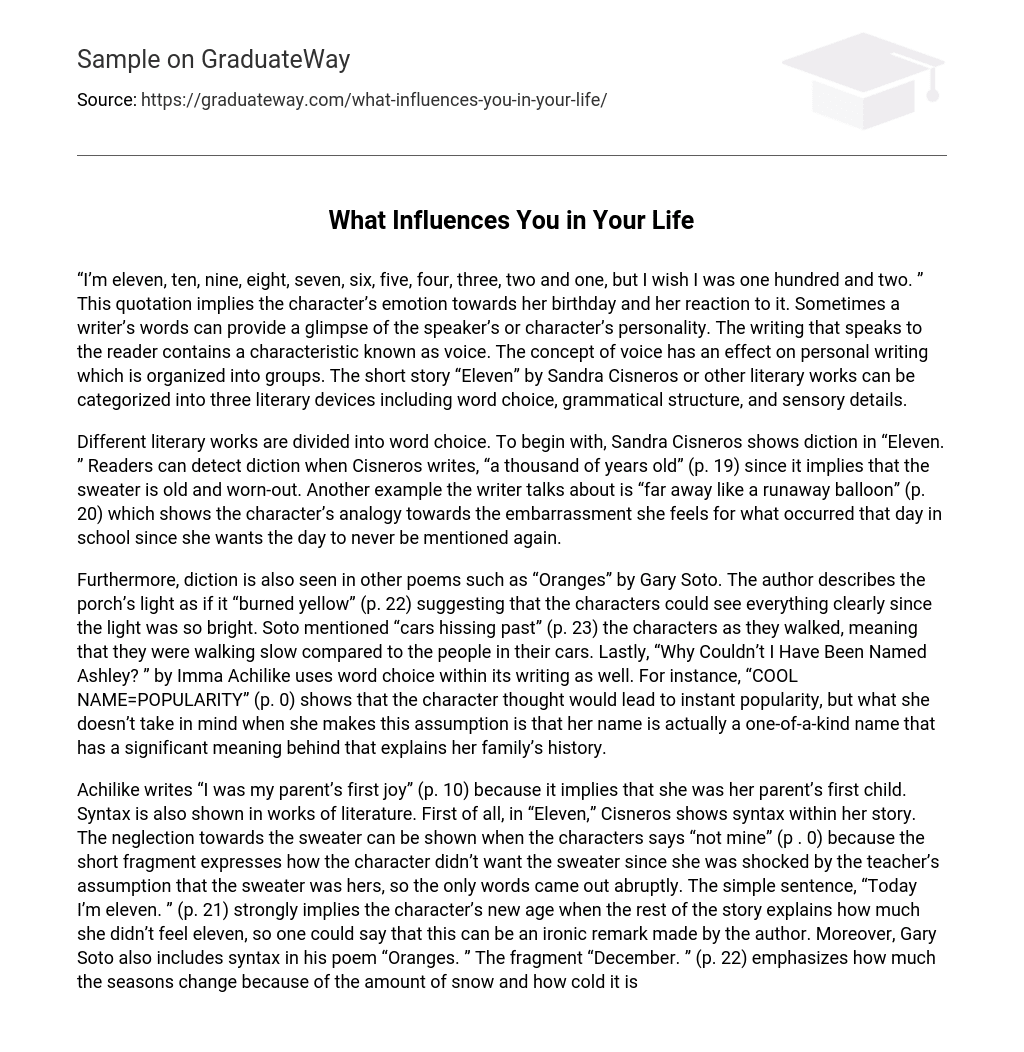“I’m eleven, ten, nine, eight, seven, six, five, four, three, two and one, but I wish I was one hundred and two. ” This quotation implies the character’s emotion towards her birthday and her reaction to it. Sometimes a writer’s words can provide a glimpse of the speaker’s or character’s personality. The writing that speaks to the reader contains a characteristic known as voice. The concept of voice has an effect on personal writing which is organized into groups. The short story “Eleven” by Sandra Cisneros or other literary works can be categorized into three literary devices including word choice, grammatical structure, and sensory details.
Different literary works are divided into word choice. To begin with, Sandra Cisneros shows diction in “Eleven. ” Readers can detect diction when Cisneros writes, “a thousand of years old” (p. 19) since it implies that the sweater is old and worn-out. Another example the writer talks about is “far away like a runaway balloon” (p. 20) which shows the character’s analogy towards the embarrassment she feels for what occurred that day in school since she wants the day to never be mentioned again.
Furthermore, diction is also seen in other poems such as “Oranges” by Gary Soto. The author describes the porch’s light as if it “burned yellow” (p. 22) suggesting that the characters could see everything clearly since the light was so bright. Soto mentioned “cars hissing past” (p. 23) the characters as they walked, meaning that they were walking slow compared to the people in their cars. Lastly, “Why Couldn’t I Have Been Named Ashley? ” by Imma Achilike uses word choice within its writing as well. For instance, “COOL NAME=POPULARITY” (p. 0) shows that the character thought would lead to instant popularity, but what she doesn’t take in mind when she makes this assumption is that her name is actually a one-of-a-kind name that has a significant meaning behind that explains her family’s history.
Achilike writes “I was my parent’s first joy” (p. 10) because it implies that she was her parent’s first child. Syntax is also shown in works of literature. First of all, in “Eleven,” Cisneros shows syntax within her story. The neglection towards the sweater can be shown when the characters says “not mine” (p . 0) because the short fragment expresses how the character didn’t want the sweater since she was shocked by the teacher’s assumption that the sweater was hers, so the only words came out abruptly. The simple sentence, “Today I’m eleven. ” (p. 21) strongly implies the character’s new age when the rest of the story explains how much she didn’t feel eleven, so one could say that this can be an ironic remark made by the author. Moreover, Gary Soto also includes syntax in his poem “Oranges. ” The fragment “December. ” (p. 22) emphasizes how much the seasons change because of the amount of snow and how cold it is.
Soto mentions “… asked what she wanted-light in her eyes, a smile starting at the corners of her mouth” (p. 23). The hyphen that was used is what the character’s girl’s reaction was to his offer to buy her candy. Last of all, “Why Couldn’t Been Named Ashley? ” contained syntax as well. The simple sentence “That was a hot. ” (p. 11) shows how much the character laughed and had a good time with her cousin. Imagery organized literary works into sensory details. First, Cisneros utilizes imagery in her story “Eleven. ” “My face was all hot” (p. 21) relates to the senses since feel and sight can be both ways of experiencing this.
Cisneros also expresses syntax when she writes “I take it off right away” (p. 21). The reader can see the character’s desperation to get rid of the sweater; therefore it uses the sense of sight. Second, “Oranges” by Gary Soto includes imagery to make the readers appeal to the senses. “Face bright with rouge” (p. 22) explains the girl’s facial expression as she is getting out of her home t meet with the boy. “So bright against the gray of December” (p. 23) shows how the oranges’ bright color stood out, so as the boy unpeeled the oranges, the aroma surrounded the air around them causing the sense of smell to take place.
Finally, “Why Couldn’t I Have Been Named Ashley? ” by Imma Achilike expresses imagery. “Sink into the ground” (p. 11) shows the reader how much embarrassment the character was feeling when the teacher mispronounced her name and everybody laughed. “His chubby face started to turn red” (p. 11) describes in detail the kid’s reaction toward the mispronunciation of Imma’s name, since the reader can see his face changing. To sum up, poems and short stories, such as: “Eleven” by Sandra Cisneros, “Oranges” by Gary Soto, and “Why Couldn’t I Have Been Names Ashley? by Imma Achilike, have narrators with strong and engaging personal voices. Diction, syntax, and imagery work together to convey voice effectively. The story “Eleven” by Sandra Cisneros expresses the literary devices more clearly than the other stories because it emphasizes diction, syntax, and imagery within its context. Moreover, “Oranges” by Gary Soto also included many of the literary devices, but I found it quite difficult to find them since poems can sometimes be tricky to focus upon. On the other hand, an author needs to know how to analyze and use the literary devices to show his/her symbolism.





